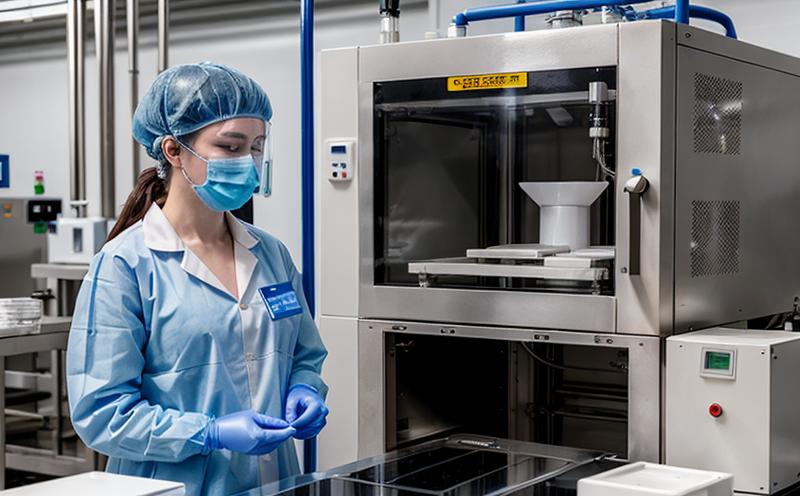GMP Bacterial Endotoxin Method Suitability Testing
The GMP Bacterial Endotoxin Method Suitability Test is a critical procedure in pharmaceutical manufacturing that ensures the safety and compliance of drug products. This test verifies whether the bacterial endotoxin testing method used by manufacturers meets the required standards, ensuring accurate results and consistent quality.
Bacterial endotoxins are lipopolysaccharides found in the outer membrane of Gram-negative bacteria. They can trigger a strong inflammatory response in humans and animals, which is why their presence must be strictly controlled in pharmaceutical products. The European Pharmacopoeia (EP) 8.5.1 defines the suitability test as an essential step to confirm that the method used for bacterial endotoxin testing is appropriate.
The suitability test involves running a blank sample through the intended testing apparatus and reagent system. The result of this blank run must fall within specific acceptance criteria to demonstrate the suitability of the method. This process ensures that any detected endotoxins are genuine rather than artifacts from the testing procedure itself. Compliance with these standards is not only a legal requirement but also a crucial step in maintaining patient safety and product integrity.
The test typically involves several steps: preparation of the reagents, calibration of the apparatus, running the blank sample, recording and analyzing the results, and ultimately determining whether the method is suitable for use. The entire process must adhere to strict Good Manufacturing Practice (GMP) guidelines, which emphasize quality assurance and control throughout all stages of pharmaceutical production.
Understanding the intricacies of this test requires knowledge of both the theoretical underpinnings and practical applications. For instance, the suitability test is often conducted using a LAL (Limulus Amoebocyte Lysate) chromogenic substrate test, which detects endotoxins by measuring the activation of the amoebocyte lysate from the horseshoe crab.
The importance of this testing cannot be overstated. Compliance with GMP and European Pharmacopoeia standards is essential for maintaining product quality and ensuring patient safety. A suitability test failure can lead to significant delays in drug release, increased production costs, and potential legal ramifications. Therefore, it is crucial that pharmaceutical manufacturers invest in robust testing protocols and reliable equipment.
Real-world usage of this method often involves regular calibration checks, validation exercises, and documentation of all procedures. These practices ensure not only compliance with regulatory requirements but also continuous improvement in quality control processes. By adhering to these standards, pharmaceutical companies can maintain a high level of product safety and reliability, which is paramount in the healthcare industry.
In summary, GMP Bacterial Endotoxin Method Suitability Testing is an indispensable part of ensuring that the bacterial endotoxin testing method used by manufacturers meets the required standards. This test plays a pivotal role in maintaining patient safety and product integrity, aligning with international regulations such as the European Pharmacopoeia 8.5.1.
Eurolab Advantages
EuroLab is uniquely positioned to provide comprehensive GMP Bacterial Endotoxin Method Suitability Testing services due to our deep expertise and advanced facilities. Our team of highly qualified scientists ensures that every test adheres strictly to international standards, including the European Pharmacopoeia 8.5.1.
- Comprehensive Expertise: Our staff includes experts in pharmaceutical testing who have extensive experience in executing GMP Bacterial Endotoxin Method Suitability Tests.
- State-of-the-Art Facilities: We employ cutting-edge technology and equipment to ensure accurate and reliable results.
- Compliance with Standards: Our processes are meticulously designed to meet all relevant international standards, including ISO 17025 for laboratory accreditation.
- Dedicated Support: Our clients receive dedicated support from our team of experienced professionals throughout the testing process and beyond.
EuroLab's commitment to excellence and quality ensures that you can trust us with your GMP Bacterial Endotoxin Method Suitability Testing needs. With us, you are assured of accurate results and peace of mind regarding product safety and compliance.
Why Choose This Test
- Avoids False Positives: By confirming the suitability of the testing method, this test helps prevent false positive results that could mislead manufacturers into thinking their products contain endotoxins when they do not.
- Ensures Method Validity: The suitability test ensures that the method used for bacterial endotoxin testing is valid and reliable, enhancing overall product quality.
- Promotes Regulatory Compliance: By adhering to GMP and European Pharmacopoeia standards, this test ensures compliance with regulatory requirements, which is essential for product approval and market entry.
- Reduces Risks: Ensuring the suitability of the testing method reduces risks associated with potential endotoxin contamination in pharmaceutical products.
The GMP Bacterial Endotoxin Method Suitability Test is a vital component of any quality assurance program. By choosing this test, manufacturers can mitigate risks and ensure that their products meet strict safety and efficacy standards. This not only protects the health of consumers but also enhances the reputation of pharmaceutical companies.
Competitive Advantage and Market Impact
EuroLab's GMP Bacterial Endotoxin Method Suitability Testing services provide a significant competitive advantage in the pharmaceutical industry. By ensuring that our clients' testing methods meet strict international standards, we help them maintain a high level of product quality and safety. This is crucial for gaining and retaining market share.
Our comprehensive approach to testing not only ensures regulatory compliance but also helps pharmaceutical companies differentiate themselves from competitors by delivering consistently reliable products. In an increasingly competitive global market, this level of quality control can be the deciding factor in winning contracts and securing new clients.
The impact of our services extends beyond individual clients; it contributes to the overall integrity and reputation of the pharmaceutical industry as a whole. By promoting best practices and adherence to international standards, we help foster trust among consumers and regulatory bodies, ultimately benefiting the entire sector.





